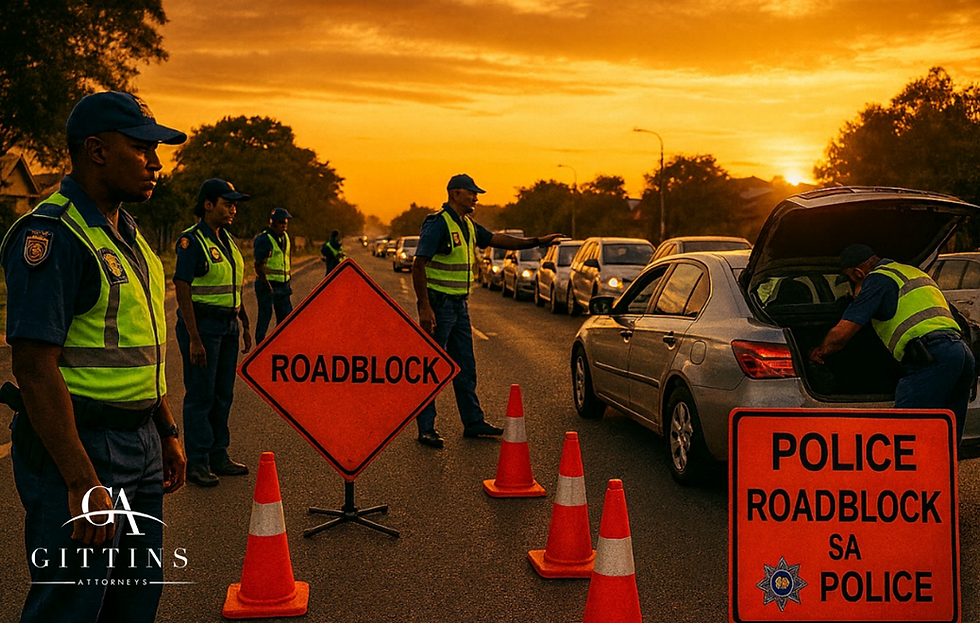GUN LAWS IN SOUTH AFRICA: A SYSTEM PLAGUED BY DELAYS
- Gittins Attorneys Law Firm

- Feb 25, 2025
- 3 min read
Updated: Sep 10, 2025

South Africa’s gun laws are among the strictest in the world, primarily governed by the Firearms Control Act of 2000 (FCA). The Act was introduced to regulate firearm ownership in a country grappling with high levels of violent crime. However, the administration of firearm licensing, renewals, and policy reforms has been marred by delays, inefficiencies, and legal challenges, leaving citizens in a state of uncertainty.
The Legal Framework
The FCA mandates that individuals undergo a rigorous application process to own a firearm legally. This includes background checks, competency tests, and strict justifications for ownership. In theory, these measures aim to reduce gun-related crime and ensure responsible ownership. However, in practice, inefficiencies within the system have resulted in significant delays in processing new licenses and renewals, causing frustration among both gun owners and law enforcement agencies.
Delays in Firearm Licensing and Renewals
One of the most pressing issues in South Africa’s gun control system is the backlog in firearm licensing and renewals. The South African Police Service (SAPS), responsible for administering firearm licenses, has consistently struggled with processing applications in a timely manner. Many applicants face months or even years of waiting before receiving approval, leaving them in limbo.
Additionally, firearm renewals have become a contentious issue. The FCA requires that firearm licenses be renewed periodically, but many gun owners have found themselves in legal limbo due to delays in renewal processing. A 2018 Constitutional Court in Minister of Safety and Security v South African Hunters and Game Conservation Association (CCT177/17) determined that expired licenses could not be renewed, meaning gun owners had to surrender their firearms, further exacerbating the crisis. This ruling led to the accumulation of thousands of unlicensed firearms, many of which were meant to be surrendered but remained in private hands due to confusion and inefficiency in the system.
Impact on Gun Owners and Public Safety
The delays in firearm licensing and renewals have had significant implications. For legal gun owners, prolonged waiting periods can mean an inability to defend themselves, particularly in high-crime areas. Many law-abiding citizens who seek to renew their licenses risk becoming unintentional criminals due to administrative delays beyond their control.
Moreover, the backlog in processing licenses has created opportunities for illegal gun trade. With delays and restrictions on legal firearms, criminals often turn to black market weapons, worsening the country’s already high crime rates. This raises
concerns about whether South Africa’s strict gun laws effectively curb violence or merely disarm responsible citizens while illegal firearms remain readily available.
Legislative and Policy Delays
Efforts to amend the FCA have been slow and controversial. Proposed amendments to the law include stricter gun control measures, such as the removal of self-defence as a valid reason for firearm ownership. This has sparked significant public debate, with critics arguing that the government is failing to address the real issue—illegal firearms—while imposing excessive restrictions on law-abiding citizens.
Despite promises to streamline the licensing process, SAPS has been plagued by inefficiencies, including outdated systems, corruption, and understaffing. The delays in policy implementation further compound frustrations among gun owners, who are left navigating an inconsistent and unclear regulatory framework.
The Way Forward
To address the ongoing delays and inefficiencies in South Africa’s firearm control system, several steps must be taken:
1. Streamlining Administrative Processes
SAPS should modernize its licensing system, implement digital solutions, and allocate more resources to process applications efficiently.
2. Clearer Policy Guidelines
Policymakers must provide transparent and realistic guidelines on firearm licensing, ensuring that law-abiding citizens are not unfairly penalized due to administrative backlogs.
3. Stronger Action Against Illegal Firearms
Rather than solely focusing on restricting legal firearm ownership, authorities must intensify efforts to combat the proliferation of illegal weapons, which remain a major driver of violent crime.
In conclusion, while gun control remains a necessary component of public safety in South Africa, the delays and inefficiencies in firearm licensing have created more problems than solutions. A more effective, balanced approach—one that ensures responsible gun ownership while addressing illegal firearms—is crucial to improving security and public trust in the system.



Comments